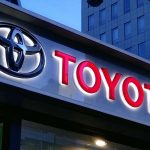In a significant move to align with Nigeria’s evolving economic landscape and the Federal Government’s environmental sustainability goals, Toyota Nigeria Limited has announced plans to introduce fuel-efficient and hybrid/electric vehicles into the Nigerian market.
The announcement was made by the Managing Director of Toyota Nigeria Limited during a press conference held on Thursday in Lagos. The event also marked the opening of the second edition of the exclusive Toyota Motor Show at Lekki, where a wide range of Toyota models and services were showcased, including the Land Cruiser, Hilux, Fortuner, Granvia, and Prado, as well as Toyota parts, motor oil, and body and paint services.
Highlighting Toyota’s forward-looking approach, the MD revealed that two hybrid vehicles,the Urban Cruiser and the Corolla Cros will soon be introduced as part of the company’s response to the Federal Government’s green initiative. He explained that these hybrid vehicles, equipped with extra battery packs, are designed to offer greater fuel efficiency and longer driving range, addressing both economic and environmental concerns.
The MD also disclosed that the company will launch a new compact SUV model described as a mini Land Cruiser, expected to enter the market by late 2025 or early 2026. This model will feature a 2.4-litre engine and four-wheel drive, positioned slightly below the RAV4 in size.
In his remarks, the Toyota boss reaffirmed the company’s commitment to offering a diverse lineup of models to meet the varied needs of Nigerian consumers. He added that the ongoing motor show, which runs from May 27 to June 1 (excluding May 30), offers visitors access to discounted prices on select models and highlights Toyota’s robust after-sales support.
“In terms of product introduction, later this year, we will be launching the Starlet Cross, an SUV variant alongside updated models of the Corolla Cross and RAV4,” he said.
Toyota Nigeria’s upcoming lineup is seen as part of its broader strategy to provide consumers with more energy-efficient options amid rising fuel costs and growing demand for eco-friendly transport solutions. The company’s move also supports the Nigerian government’s recent policies encouraging the adoption of clean energy technologies in the automotive sector.
With growing interest in sustainable mobility and the shift towards alternative energy vehicles gaining momentum globally, Toyota’s local adaptation of hybrid technology signals a new phase in Nigeria’s auto industry—one that embraces innovation, efficiency, and environmental responsibility.










